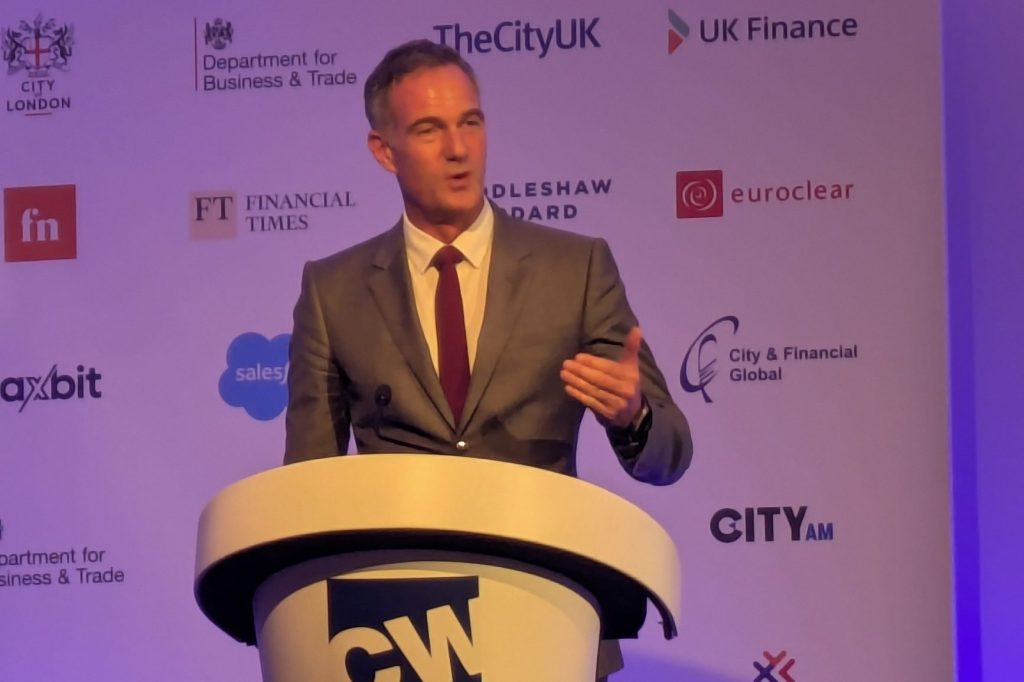This is a transcript of the podcast Ellora Roy on the challenges of implementing the UK Consumer Duty between GRIP Senior Report Carmen Cracknell and Ellora Roy.
[INTRO]
Carmen Cracknell: Welcome back to The Grip Podcast. Today, I’m joined by Ellora Roy, a consultant with over a decade of experience in banking and financial services. She’s recently been focused on the coming consumer duty due to come into force at the end of July. Ellora, could you just give us a bit of background on you and how you got involved in all this?
Ellora Roy: Sure. So I’ve been in the business consulting industry for over 16 years now. I started my career in 2006, right after my MBA as a management consultant within the banking and financial services industry. In this time, I’ve worked with several consulting firms and numerous clients, of course, banking, wealth and asset management, and a bit with insurance.
I currently work with Cognizant within their banking and financial services consulting practice. Now, financial services, as you can imagine, is a highly regulated industry. And since the financial crisis of 2008, we’ve seen the regulatory framework becoming more robust and strict. The last decade or so, the industry has witnessed a spate of regulations around conduct, consumer protection, and market integrity. And with these developments, my clients have increasingly needed help with regulatory compliance, whether it’s understanding the requirements itself and identifying gaps or assisting them in building a roadmap for compliance. I have been involved in some form or the other. I’m primarily working the area of governance, risk, and compliance, which is GRC for short, which again is a broad area. But my focus lies within conduct. So a lot of work is around conduct related regulations, such as treating customers fairly, the senior manager certification regime, and of course, like I mentioned, the very new consumer duty.
Carmen Cracknell: Amazing. So so much experience there. The 31st of July this year has been set by the FCA as the deadline for firms to adhere to the consumer duty. Why have they decided this right now? As you’ve said, there’s been a kind of spate of regulation in the last 10 years or so. Why now?
Ellora Roy: Well, I suppose there’s a bit of a backstory to the consumer duty regulation, as you will probably be aware that we used to have, we still do, it came out in 2006, something called treating customers fairly. Now, the consumer duty, this is again mandated by the parliament, where the FCA has been asked to regulate firms on this duty is being called the cornerstone of the FCA’s three year strategy. This regulation is expected to help theFCA set and test higher standards and reduce and prevent serious harm. The focus of the duty is to put an emphasis on the outcomes for consumers, which is slightly different from TCF requirements, which came out in 2006. So rather than firms demonstrating that customers are treated fairly, the duty takes it a step further by ensuring that customers experience benefit focused outcomes, which I think is a huge shift in mindset with some wide ranging impact. And it’s not just for the implementation of the duty, but also impacting compliance with other regulations. For example, if you consider the FCA’s consultation paper from October last year on sustainability, which proposed certain rules around product labeling and classification requirements, disclosures and so on, it also had an anti green, green washing rule to protect consumers. Now, when you apply the consumer duty lens on these requirements, you will notice that firms will now need to consider how they test, monitor and adapt sustainability, labeling, marketing and so on, just to make sure that consumers understand this properly, which is, which is one of the key pillars of the new consumer duty requirements. So so I guess, I guess the timing is just right in terms of, you know, firms trying to make sure that they they they sort of focus more on the outcomes they’re delivering for the customers, rather than just the business objectives.
Carmen Cracknell: And what will the impact of the consumer duty be on regulatory compliance in particular?
Ellora Roy: Well, I suppose, like I was mentioning earlier, that this is quite a huge shift in terms of the mindset. So it’s sort of the FCA’s sort of asking firms to focus on delivering good customer outcomes. So the shift is from our doing last year’s financial performance to our doing customers, good outcomes for customers. And the impact is not just limited to the consumer duty itself, but also to other regulations. Like I was giving you that example of sustainability disclosure requirements, where anything new that comes in the market will now have to be looked into and under the lens of consumer duty as such. So people, firms will have to consider how does that impact my customers?
And it’s specifically in case they have vulnerabilities in their target market, and those kinds of things we need to be need to be considered. And there’s a lot of skepticism about whether businesses will be ready to implement this with a lot of people saying, no, they won’t be able to.
Carmen Cracknell: Why is it so challenging for businesses and what can they do to keep up with this kind of regulation?
Ellora Roy: Well, one of the key things to sort of understand here is that the consumer duty is quite different from traditional regulations. There are no prescriptive rules. It’s an outcomes based regulation. So essentially, what the regulator has said is you decide what is good for your customers because you know your customers well, you know what kind of products and services are on offer, and then you evidence it to us that you have delivered good outcomes for them. So that is quite a different way of different approach to complying with requirements. Now, when it comes to implementation, I think the implementation experience itself will be unique to each firm based on the products and services they have on offer based on the customer base of the target market for these products and services. And finally, how mature the firm is in terms of their operating model to support these changes. We know the timelines are quite tight. Therefore, firms will need to assess carefully and tackle the riskiest areas first. That is outcomes that cause the most harm. And this is for the simple reason that the regulator has said they will prioritize the most serious breaches and act swiftly and assertively where they find evidence of harm or risk of harm to consumers.
It is particularly not easy with the current cost of living crisis and increasing interest rates. Another challenge would be data to corroborate how certain measures can help generate good customer outcomes. This is one of the practical challenges I’m seeing with some of my clients.
The point is that all the problems may not be resolved by the deadline, but as long as firms have put in some thought into prioritizing what needs to happen by the 31st of July and have a plan or a plan for a plan for day two requirements, I think they will find the regulator on their side. So there won’t be consequences for firms or what will be the consequences for firms that don’t implement in an appropriate way? I suppose the term, the terms, whether the implementation has been appropriate or not, it will be dependent on the firm’s requirements. As long as firms are able to evidence that they have done whatever they possibly could within the timelines and have tried to resolve the most riskiest of areas first, at the same time they’ve got a plan of action for day two requirements or things that will come later in the year may not necessarily hit the deadline, I think the FCA will be more considerate in terms of dealing with them. Because like they have said recently that the enforcement and the supervision is going to be in proportionate with the harm that will or the risk of harm that it may cause to consumers.
Carmen Cracknell: Right and in terms of the main cultural changes that are said to be made, have companies appointed a consumer duty champion as you kind of advised that they should looking forward to this at the board level to oversee the process? How many companies are doing that? How fast should they be doing that do you think?
Ellora Roy: Well I suppose this should have happened ideally when the implementation plans were submitted last year, the deadline was 31st of October 2022. By then there was a requirement where the firm’s governing bodies and the board were required to sign it off before they were presented to the FCA and at the time I suppose firms should have identified consumer duty champions at the board level and also should have identified the key senior managers within the firm who would be responsible for different outcomes within the duty. Now it also depends on the structure for example some of my clients where the organization structure is quite difficult or quite complex they have appointed not one but two consumer duty champions. Now that is not sort of a standard or a precedent but it’s more sort of dependent on the firm’s structure and what kind of implementation plan they will have to put in place to make this work. So yes to answer your question they should have already identified, firms should have already identified a consumer duty champion who should be overseeing the implementation and come next year another requirement which is more around monitoring and governance will become applicable that is firms will be required to assess their consumer duty implementation and also monitor the outcomes to make sure that they are complying with the duty at least once a year and that will have to come from the consumer duty champion at the board level.
Carmen Cracknell: Right so this is a new position that’s been created to oversee this process within companies?
ELLORA: Well there was a guidance there was some guidance provided by the regulator which said that a non-executive director would probably be a preferred option for a consumer duty champion so some firms may decide to get a new person in for this particular role or it could be an existing non-executive director who could play the role of a consumer duty champion and who sits on the board.
Carmen Cracknell: Is this the first in a kind of procession of other pieces of regulation that are going to come do you think?
Ellora Roy: It is hard to say but it’s definitely part of the FCA’s three-year strategy and this seems seems to be a crucial piece of legislation in the sense that it’s sort of changing the way regulatory compliance has been seen in the past. I have seen clients coming and asking questions about what is it that the regulation is asking us to do. The answer to that question is there is nothing specific or prescribed in the regulation. It’s as though the FCA has asked firms to mark their own homework. They’ve asked firms to define what good outcomes would look like for their consumers and then monitor it on a continuous basis to see that they are in fact delivering those outcomes and whether they are good or bad and up to scratch.
Carmen Cracknell: You mentioned the FCA’s three-year strategy. They are very focused right now on becoming a data-led regulator. What does this mean? How can it be achieved and where does this data focus come from?
Ellora Roy: Well the FCA is not unfamiliar with the progress we’ve made with technology and data as well as the role of the big tech within the financial services industry. So I think with the consumer duty the regulator is trying to step up its own approach to regulate firms. Again sort of going back to the outcomes focus point. As the FCA is asking firms to use data and metrics to evidence customer outcomes, the regulator also has plans of using such data and metrics available within the industry to measure and monitor firms. Unfortunately we still don’t have the full supervisory roadmap for consumer duty but through various industry engagement the regulator has made it abundantly clear that they want firms to harness the benefits of data and technology to improve their services and understand the outcomes they achieve for their customers. The FCA has also acknowledged that this is a new territory for them too and I won’t be surprised if there’s a bit of you know back-end work being done just as we speak. While firms are preparing for the implementation of the duty, the FCA is also preparing its new ways of regulating firms and relying mostly on data and analytics to sort of gauge whether firms have been compliant or not.
Carmen Cracknell: What are the biggest challenges for the FCA do you think at this time when it’s thinking about the type of regulation to come up with? What needs to be regulated? What are the main issues do you think?
Ellora Roy: I suppose given that there are no prescriptive rules the FCA will have to come up with a framework that will focus on specific type and size of firms and which will also focus on certain outcomes which could be seen as industry benchmarks and therefore rely on data or analytics that is available in the market to sort of say and assess whether the outcomes achieved by the firms are in line with those industry benchmarks or not and this to me is more of a process so we might see a bit of an evolution in the way it’s done the first year and then the years to come where the approach might change and might be tweaked to suit the requirements. There’s also a bit of concerns around not all firms will have the same amount of technology or data support to corroborate and measure their performance so I suppose the FCA might have to think about different ways of supervision and regulating firms depending on the maturity.
Carmen Cracknell: You mentioned sustainability earlier as one of the standards. Is there a bigger focus on this now than there ever has been in the past and if so why?
Ellora Roy: Well sustainability, are you saying in relation to consumer duty or separately?
Carmen Cracknell: Both really but I guess in terms of regulation in general are there more regulations emerging with that thrust and focus on sustainability?
Ellora Roy: Yes of course I think green finance or sustainability is another sort of key priorities for the FCA and not just here in the UK but you know across the world. The fact that there’s so much of political, social and economic pressures on us to sort of imbibe a world which is more sustainable and more green in nature and the fact that the responsibility of the financial services sector to sort of steer the world towards a more sustainable environment is crucial and that’s why I guess the attempts are being made to first of all the availability of data and consistency of frameworks and how to measure, how do you say that a certain investment is sustainable or not and similarly how do you report on that? So I guess there’s a lot of effort being made from all sides to make sure that we come up with a framework that will help us measure and move towards a sustainable world. Now from a consumer duty perspective this is again very important because at the end of the day firms are being asked to advertise and label and come up with their literature which will be consumer friendly, which will be easy to understand and which will be fair to customers for them to sort of go ahead and invest in the right things which are more sustainable in nature and therefore from an outcomes perspective this becomes key that when firms look at other regulations which has an impact on consumers and consumer outcomes they have to look at it from a consumer duty angle to make sure that they are complying with the four outcomes of products and services, price and value, consumer support and consumer understanding.
Carmen Cracknell: And you mentioned frameworks, the smart framework, specific, measurable, achievable, realistic and timely. How helpful is that in helping the FCA achieve its goals?
Ellora Roy: Well I suppose the smart framework as you said is a best practice framework for setting goals. Now considering the focus and outcomes within the duty I think it would be advantageous for firms to embrace an approach similar to the smart framework which would allow them to be specific in terms of defining the problem, the desired end state or resolution for the problem, as well as the success criteria for these outcomes. And even from a governance perspective like I mentioned earlier the FCA is expecting firms to review that they’re delivering good outcomes consistent with the duty at least once a year. So to this end firms will need data and measuring criteria to assess and corroborate the outcomes delivered to their customers. Therefore I think it’s very important for firms to think about a data-led approach which will also help identify gaps and trigger the need to take any corrective actions quite quickly. And that’s when that’s where I think a framework like the smart framework could come in handy which would sort of makes it more tangible to define the outcomes and what needs to be achieved.
Carmen Cracknell: Well data certainly is the future isn’t it in all fields apparently. Awesome thank you very much for joining me.













